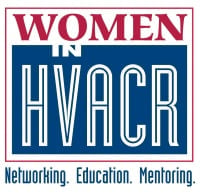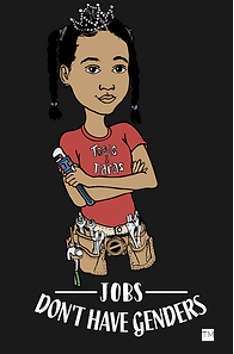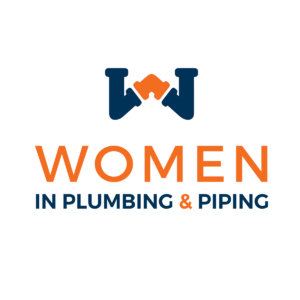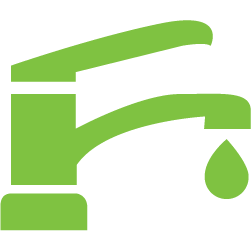Women In The Trades
More Women are Needed in the Trades:
The skilled trades of plumbing, heating, cooling and electrical keep our country running and are essential in keeping our communities safe and healthy.
While the trades have been a male-dominated field historically, more and more women are starting to join the industry. With the projected job growth and financial freedom provided, the trades are an engaging and satisfying career path.
There are many organizations that are dedicated to bringing more women to the trades of plumbing, heating, cooling, and electrical.
To learn more about the trades from a woman’s perspective, discover mentoring opportunities, and to learn more about the day in a life of a tradeswomen, check out the following groups listed below.

Trades Advocacy Organizations

Women in HVACR
Women in HVACR is the first international organization for Women in the Heating, Ventilation, Air Conditioning & Refrigeration industry.
Our members are dynamic women making great strides in what has typically been a male-driven industry. We are engineers, sales associates, business owners, trainers, support professionals, and students representing manufacturers, suppliers, or contractors in our trade. Most importantly, we are laying a path for a thriving future in this industry for other women. In fact, our potential is so high that many men in the HVAC field have joined our ranks and continue to do so every day!
Women in HVACR invites you to join our organization as we mentor and educate others about the vast opportunities available in our field, and provide ongoing resources for educational and professional development that will help us expand our existing roles in the industry.

Women in HVACR Canada
Women In HVAC-R mission is to provide a forum to promote the inclusion and advancement of women in the Heating, Ventilation, Air Conditioning and Refrigeration (HVAC-R) industry in Canada. We will achieve our objectives through networking, education, mentoring and professional development activities specifically dedicated to supporting women in building long-term productive careers in a thriving, essential services industry.
Women in Plumbing & Piping
Women in Plumbing & Piping is a membership organization that focuses on the inclusion, empowerment, and support of women in the plumbing industry, from the field to the boardroom, providing a place for you to thrive and unlock your full potential.
Our focus is on connecting, empowering, and supporting the contributions of women so that together we can bring the industry to a new level of excellence and help address the ongoing workforce shortages.

Tools and Tiaras
At Tools & Tiara’s, we are passionate about creating an avenue where young girls can showcase their talents and succeed non-traditional roles, our belief is that the future of the construction industry depends on the ability to get all capable hands on deck and harness the talents of young girls and women especially in this field. Working hand in hand with education providers, research institutes and businesses, we hope we can encourage more young girls to jump on this wagon.
We hope to provide access to women who have done it before, making available learning programs and practical tools thus creating a network of women who share the same passion and goal. We know we stand a better chance at succeeding when we are united in the pursuit of a common goal.
Why consider a career in the trades? Why not!
Working for a plumbing, heating, cooling or electrical service company provides many career opportunities and has great benefits!
As a technician, a typical day will include:
Residential service technicians travel to different homes and meet new clients each day. You’ll be like an everyday superhero – taking care of your community, fixing plumbing, heating, cooling or electrical problems and keeping homeowners safe and healthy in their homes.
From the start, people are earning while they’re learning. Apprenticeships provide thorough and extensive on-the-job training and education. That means young people are earning a wage while learning technical, highly sought-after skills and on their way to six-figure salaries, not six-figure student loan debt.
Your work truck is your own space. It’s a mobile office and warehouse all in one. Keeping it clean, fully stocked and organized will not only make your job easier, but will provide you with a sense of pride. Residential service companies provide many career opportunities for plumbers, electricians, heating and cooling technicians.
New technologies in the trades are always advancing. As a technician, you’ll not only provide customers with devices that save on utility expenses, but are also energy efficient that help protect the environment.
Looking for a career that provides for leadership growth and develop? Look no further! The trades provide opportunities that allow you to master your technical abilities in the field and continue your path as a service manager, general manager, or even as a business owner.
Our partners are essential to the success of Explore The Trades’ efforts to bridge the technical talent gap in the plumbing, heating, cooling, and electrical trades. Support from industry-leading companies and residential service businesses make accomplishing our mission possible and are leading the way in growing the skilled trades industry.
What is an apprenticeship?
Apprenticeships are a time-tested employee training system that combines job-related technical instruction with structured on-the-job learning experiences.
The benefits of going through an apprenticeship are many! Apprentices gain skills and in-depth industry knowledge through paid on-the-job training that puts them ahead of the crowd in their pursuit to a great career.
Most states require aspiring skilled PHCE technicians complete formal education through a trade or technical college. In some instances, students may complete their apprenticeship during school as part of their training. Other times, a license may be obtained in school, then followed by an apprenticeship.
Watch our video to learn more about apprenticeships.
What is an apprenticeship?
Apprenticeships are a time-tested employee training system that combines job-related technical instruction with structured on-the-job learning experiences.
The benefits of going through an apprenticeship are many! Apprentices gain skills and in-depth industry knowledge through paid on-the-job training that puts them ahead of the crowd in their pursuit to a great career.
Most states require aspiring skilled PHCE technicians complete formal education through a trade or technical college. In some instances, students may complete their apprenticeship during school as part of their training. Other times, a license may be obtained in school, then followed by an apprenticeship.
Watch our video to learn more about apprenticeships.





